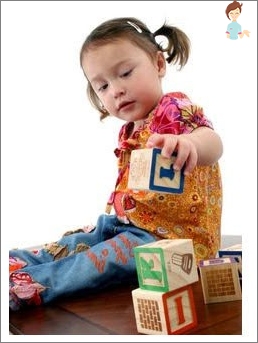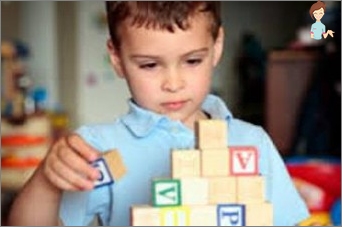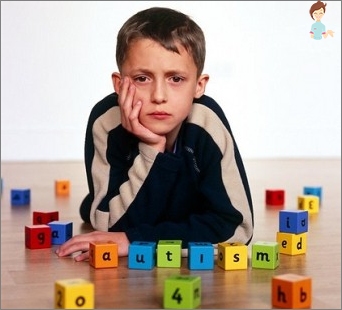Types of children’s autism: Kanner and Asperger syndromes
Why development in development treats a psychiatrist. How do autism diagnose and what are there forms. Differences of autism: Kanner Syndrome, Asperger. What treatment needs to autists
Autism in children begins to manifest themselves from the earliest years of life, his development scenario may vary greatly and will depend on what experts do your problem and how much you can find an approach to the baby with special needs. As the autism is diagnosed by the Kanner and Asperger syndrome, than fraught with both diseases and what your child expects in the future – read our article.
Autism – mental illness or development
 Despite the fact that a psychiatrist will be engaged for the entire period of examination and treatment with your child, strictly speaking his condition is not a psychotic disease. Autism is a lag in development, a disorder having a biological nature, at least, is considered to be today.
Despite the fact that a psychiatrist will be engaged for the entire period of examination and treatment with your child, strictly speaking his condition is not a psychotic disease. Autism is a lag in development, a disorder having a biological nature, at least, is considered to be today.
The symptoms of autism are easily revealed due to the fact that the baby from an early age is distinguished by strange behavior: his spectrum of emotions is pretty zakud, it often loops on some actions and subjects, does not speak and does not come to contact. The closure itself is not a sign of mental retardation, but when diagnosing this particular indicator begins to appear on the fore.
The gradation of the disease includes deep personality defeat with a tangible mental lag (canner) and less noticeable emotional underdevelopment against the background of ordinary or high intelligence (Asperger).
The disorders spectrum also includes such forms as the Rett syndrome with the connection of motor dysfunctions (inability to control not only emotions, but also the body of the body), the Savant syndrome (autism of gifted children) with the presence of a person in any form of art or accurate science.
Another specific type of development disorder does not apply to autism, although etymology is preserved in the title – it is high-functional autism. We are talking about the preserved ability to independently solve the everyday tasks of communication, while non-standard situations a person passes with difficulties or can not cope with them at all.
Productive psychotic symptoms in diseases of any kind is absent: children are not degraded, they do not suffer from personality dissociation, crazy states or inability to distinguish reality from the fictional world of fantasies.
However, due to the connection of the disease with the neurobiological functions of the body and their influence on the behavior, autism refers to the field of psychiatry, and not neurology.
How to determine autism in children
The basis for verification will be the complaints of parents on the peculiarities of the behavior of their child, which can be noticed at age when other children are connected to conscious contacts with adults and peers. In the first years of life, autism also has its own manifestations – in games, facial expressions, contacting contacts with people, etc.
But while the child does not demonstrate the speech lag, talk about the presence of autism syndrome early. Suspecting the disease, do not rush due to single oddities to keep your son or daughter for receiving a doctor, but also do not ignore them – early diagnosis will be carried out both in conditions of communication and experiments and from your words.
Later detection of the disease, as a rule, is not a real danger, so if your baby is still very small, stop to memorize (write) specific symptoms that you observe, as well as their frequency and circumstances.
The symptoms of the Kanner syndrome include the following states:
- The child is unable to maintain visual contact with people, parents and unfamiliar;
- In his actions, there is a ritual, repetition of movements in a certain sequence;
- inability to evaluate the situation and realize the danger or threat;
- So-called Echolalia – multiple repetition «Lutching» sounds, sound resistance instead of a full-fledged speech;
- Flashing of aggression against loved ones and strangers who enter into contact with him;
- The need to reinstate the game for itself, strange rules of the game, the inability to play with other children due to ignoring the general rules and the appointment of their own;
- Communication with objects and along with this refusal to communicate with people;
- One of the main symptoms is Mutism (persistent silence and ignoring speeches and appeals aimed personally to him).
Mutism is observed throughout his life, its symptoms are characteristic of any age – from early childhood to mature years. No special demonstration silence carries, it cannot be considered intelligent, it does not apply to the genus of manipulations with some purpose, for example, punish loved ones or attract attention.
Refusal of speech becomes a consequence of immersion into the world of own experiences and dreams. He is not associated with the inability to speak at all or with a limited set of words, it is not shy, and the complete lack of motivating to communicate verbally.
To achieve reaction with the help of words from a child with Kanner syndrome and Asperger syndrome in most cases, it is impossible if his consciousness slammed for external relations at this moment.
What is the difference between Kanner and Asperger syndromes?
 In essence, this is not a question for diagnosis and therapy, but for the history of the disease, and different doctors can have different opinions on this. Experience shows that foreign doctors are more often diagnosed asperger, our domestic – canner, and this selectivity can probably be explained by the tradition of medicine and in the West.
In essence, this is not a question for diagnosis and therapy, but for the history of the disease, and different doctors can have different opinions on this. Experience shows that foreign doctors are more often diagnosed asperger, our domestic – canner, and this selectivity can probably be explained by the tradition of medicine and in the West.
It is usually believed that intelligence is preserved during Asperger syndrome, the mental retardation is characteristic. However, psychiatry is wrong to consider precise and final medical science, some of its definitions and diagnoses are unstable and unfriendly.
Is it important what kind of name is in the child’s card? On the one hand, the diagnosis is important for disability and in solving issues of further care and training of such children (specialcol, boarding school, etc.).
On the other hand, the tactics of treatment for children with autism is the same in any diagnosis, and often the manifestations of the disease are so weak that when such an autista is received, they can safely neglected and arrange its life is not worse than any other.
In this case, the availability of any of these two diagnoses will be a formal obstacle to the definition of conventional school classes. Thus, the need for accurate diagnostics is determined by the main factor – whether you need a label of an autista or not.
Seeking revision and changing the diagnosis of Kanner on Asperger makes sense if you want to avoid isolation from the usual children’s environment, and at the same time I am sure that it will be better.
Fundamentals of treatment: Kanner and Asperger syndrome
Therapy of autism will depend on how strongly the communication abilities of the patient are affected and the affect is present (emotions are disappeared, care: catatonia, stupor.
Medications are used by distinguishing agents such as high doses of caffeine to remove the autista from the state of lethargy, closets, help him start reacting to others and speech aimed at it.
On an ongoing basis, nootropic drugs are used that help strengthen cells and brain vessels affect the nervous system of the whole organism.
Therapy also includes mandatory psychological support and development courses, which are held in the group and individually:
- classes with speechoped;
- physiotherapy;
- medical work;
- music;
- dancing;
- drawing.
 Of great importance is how much the Autist family is involved in the process of its rehabilitation. The coldness and misunderstanding from both or one of the parents negates the efforts of doctors and the achievement of the kid himself. Maternal and father’s care, love and heat in much determine the course of rehabilitation itself.
Of great importance is how much the Autist family is involved in the process of its rehabilitation. The coldness and misunderstanding from both or one of the parents negates the efforts of doctors and the achievement of the kid himself. Maternal and father’s care, love and heat in much determine the course of rehabilitation itself.
The mental development of the backward child should occur in a favorable setting, with moderate emotional impressions, in the absence of stress. In addition, the mode of the day has the most positive effect on overcoming the disease.
The forecast of the further state can only do the attending physician, besides, who observed a small patient regularly. Many cases of life show that it is quite realistic to improve even severe cases of the disease, and weak manifestations to make practically imperceptible.


